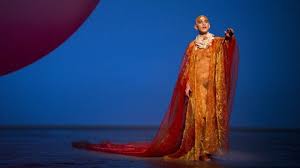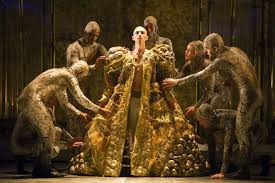London Coliseum, 4 March 2016
ENO’s production of Akhnaten some thirty years ago still vibrates in the memory and made a huge impact at the time. It is possible that Phelim McDermott’s approach will do the same. Without a doubt it will be remembered for the brilliance of the jugglers but this would be to miss the vision he brings to the work. The court of the dead pharaoh Amenhotep is one of angular steel and imperialistic weight. Even the juggling is confined within the structures and the chorus follow the professionals with some skill if little enthusiasm. It is a world of oppression and weight. The new pharaoh throws all of this over. The steel splits apart to be replaced by a vast white sphere; all is light and space, the intensely heavy costumes are replaced by diaphanous muslins, trailing gently across the stage, transparent, to reveal the androgynous sexuality beneath. The jugglers of Improbable steal the ritual items from the priests to establish a world of joy which soon gives way to enormous gently floating balls, themselves mirroring the vast globe of the sun. But it cannot last and as Akhnaten dies, the imperialistic weight returns and the ghosts are left to mourn what might have been.
Sung in Egyptian and Hebrew, with some narrated passages in English, but without surtitles, we are forced – as many of us recall from our early days of opera-going – to concentrate fully on the music and the stage. We are involved and engrossed, even though the action is unnaturally slow and often static. We are caught up in the unfolding inevitability of the narrative, for which the juggling acts as a constant gently moving stream, its rhythms catching those of the orchestra.
Within this world Phelim McDermott is not afraid to use iconic references from Christianity. Akhnaten prostrates himself like a novitiate monk before his coronation, and as he dies, he does so in the arms of the Scribe like a Pieta.
If all of this was impressive, the musical quality on the first night came close to matching it. Solo parts – particularly Anthony Roth Costanzo as Akhnaten – were beautifully floated in a work which requires bel canto voices. His radiant Hymn to the Sun was captivating. The chorus excelled as they always do.
Under Karen Kamensek the orchestra took a little time to settle. Though the scoring may appear to be straightforward in its writing, the need for utterly crisp rhythms and balance is essential. By the second act things were tighter and the third act was very moving in its intensity and ambience. ENO may have its problems at the moment – but this should be yet another example of risk taking which really pays off.


